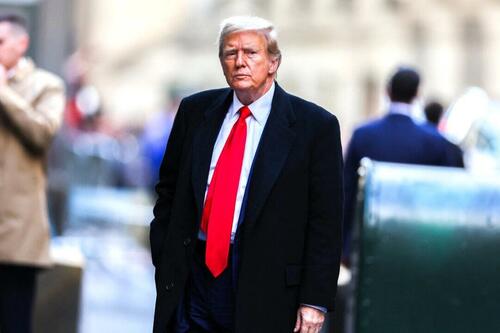
Authored by Catherine Yang via The Epoch Times,
Former President Donald Trump has posted $175 million in his New York civil fraud case, meeting the 10-day deadline given on March 25 and staying execution of judgment in the case.
The payment prevents any seizure of President Trump’s assets as his appeal of the case is heard.
“As promised, President Trump has posted bond. He looks forward to vindicating his rights on appeal and overturning this unjust verdict,” the president’s attorney Alina Habba said in a statement.
New York Attorney General Letitia James sued the 45th president in 2022, accusing him of inflating his net worth and defrauding insurers and banks, and therefore the public, in Trump Organization annual statements of financial condition.
Eric Trump, Donald Trump Jr., former Trump Organization CFO Allen Weisselberg and comptroller Jeffrey McConney, and several Trump Organization holding companies were named codefendants in the case presided over by New York Supreme Court Justice Arthur Engoron in a three-month bench trial.
The judge ultimately ordered $363 million disgorgement with 9 percent backdated interest, totaling $464 million, with the lion’s share to be paid by President Trump; as well as prohibiting the defendants from holding director positions in any business or legal entity in New York for a period of time, and a minimum three-year monitorship of Trump Organization after which there may be additional penalties.
The posting of the judgment amount was not required in order for President Trump to appeal the case, but had been a requirement to stay enforcement of the judgment in the meantime.
“I’ll fight this all the way up to the U.S. Supreme Court if necessary,” President Trump told Fox News days before the deadline. “They can’t take away your property before you’ve had a chance to appeal the decision of a Trump-hating, incompetent judge who has been overturned more than any judge in the state.”
Days before President Trump posted bond, he said on social media that he had nearly $500 million in cash but intended to use much of it on his presidential campaign. He accused his political opponents of trying to make him spend that cash fund on legal battles rather than on his campaign for president.
‘Impossible’ Bond Lowered
State law would have required President Trump to post the full judgment amount within 30 days in order to stay the execution of judgment, but the appellate court lowered the $454 million requirement to $175 million on the last day of the deadline. It gave him a 10-day window to post the new amount, and did not comment on the underlying reasons for the change.
President Trump said the appellate division’s ruling was further evidence that the original bond requirement was unreasonable.
“This is a confrontation between a Judge and those that rule above him - A very bad situation in which to place New York State and the Rule of Law!” President Trump stated of the appellate decision. “This is the 5th time in this case that he has been overturned, a record. His credibility, and that of Letitia James, has been shattered.”
Justice Engoron, who presided over the bench trial and issued the massive disgorgement figure. The attorney general had asked for $250 million in disgorgement before trial, and changed that number to $370 million near the end of the trial.
President Trump claimed in a press conference that the judge and attorney general had access to his finances because of the monitorship requirement, saw a figure close to $464 million cash, and decided that was what they were going to make him pay. He told reporters he did have the cash necessary to stay judgment, but wanted to use it to campaign and not satisfy who he described as “crooked” officials.
Putting all his cash into an escrow account where neither he nor the state could touch it for the duration of the appeal was one option to stay judgment.
A bond was another, and would not have required President Trump to move his cash reserves, but would have required him to have higher amounts of cash to serve as collateral—$577 million, by his attorneys’ estimates, after negotiations with 30-plus surety companies fell through.
For weeks, defense attorneys argued in the appellate division that securing a $464 million bond was “impossible.” Surety companies just don’t issue bonds that big, they argued.
A second problem was that for them to consider doing so they would have needed 120 percent in cash as collateral plus a high premium or two. This came out to be far more cash than Trump Organization had, as a real estate company.
Attorneys revealed that the only company even willing to consider real estate, or any hard asset, as collateral was Chubb, but after hours of negotiation into the last days of the deadline the company decided it could not accept real estate. After this negotiation failed, the lawyers attached a sworn affidavit from one of the four brokers who had been working on this for the defense to provide more context.
In the bond world, $100 million is large, he said. Only a handful of sureties are even authorized by the federal government to issue higher amounts. But most still have internal policies limiting bonds to $100 million, and when they do issue larger bonds it is only for big publicly traded conglomerates.
To underscore that fact, the attorney general had also listed several cases where bonds larger than President Trump’s were fully bonded on appeal, but they all involved large companies with billions in annual revenue, like Samsung and Apple.
Judge Expands Gag Order Against Trump in NY Hush Money Case
The judge overseeing the Manhattan district attorney’s “hush money” case against former President Donald Trump has approved a request to expand a recently imposed gag order on the president.
The decision came late Monday and gags President Trump from public discussion of family members of the court, the family members of Manhattan District Attorney Alvin Bragg, and all others named in the order, including jurors, potential jurors, witnesses, court staff, counsel, and their families.
The order does not bar comments about the judge himself or Mr. Bragg, an elected Democrat.
“This pattern of attacking family members of presiding jurists and attorneys assigned to his cases serves no legitimate purpose,” New York Supreme Court Justice Juan Merchan wrote in his 5-page ruling. “It merely injects fear in those assigned or called to participate in the proceedings that not only they, but their family members as well, are ‘fair game,’ for Defendant’s vitriol.”
While the judge noted that courts are “understandably concerned” about limiting defendants’ freedom of speech, particularly for public figures, “The circumstances of the instant matter, however, are different,” he wrote. “The conventional ‘David vs. Goliath’ roles are no longer in play as demonstrated by the singular power defendant’s words have on countless others.”
He cited in his ruling arguments from the prosecution that “multiple potential witnesses have already raised grave concerns [...] about their own safety and that of their family members should they appear as witnesses against the defendant.” The judge wrote that those fears “undoubtedly interfere” with the proceedings.
“The average observer, must now, after hearing defendant’s recent attacks, draw the conclusion that if they become involved in these proceedings, even tangentially, they should worry not only for themselves, but for their loved ones as well,” he added.
Mr. Bragg had petitioned Justice Merchan earlier in the day to expand the gag order to prevent President Trump from referencing family members of individuals involved in the case. The attorney general’s office highlighted comments from President Trump referencing the judge’s daughter as evidence of why the order was needed.
“Defendant’s dangerous, violent, and reprehensible rhetoric fundamentally threatens the integrity of these proceedings and is intended to intimidate witnesses and trial participants alike—including this Court,” state prosecutor Matthew Colangelo wrote in the court filing.
President Trump had made posts mentioning Justice Merchan’s daughter, Loren Merchan, who owns a Democrat political consulting firm. He did not refer to Ms. Merchan by name.
The former president wrote in one post, “Judge Juan Merchan, a very distinguished looking man, is nevertheless a true and certified Trump Hater who suffers from a very serious case of Trump Derangement Syndrome.
“In other words, he hates me! His daughter is a senior executive at a Super Liberal Democrat firm that works for Adam ‘Shifty’ Schiff, the Democrat National Committee, Senate Majority PAC, and even Crooked Joe Biden.”
In another, he said, “Maybe the Judge is such a hater because his daughter makes money by working to ‘Get Trump.’”
Critics responded by complaining that his posts were attacks on Ms. Merchan and false accusations.
President Trump’s attorneys had pushed back against the request, saying that it would further violate the presumptive Republican nominee’s First Amendment rights. But Judge Merchan ultimately sided with the prosecution.
They are also continuing to seek the recusal of Justice Merchan, citing a conflict of interest, over his daughter’s business, which they say has profited heavily off the prosecution of their client.
Two major Democratic clients of Ms. Merchan raised at least $93 million in political donations in a campaign that mentioned President Trump’s case in their solicitation emails, according to The New York Post.
Justice Merchan declined to recuse himself from the case last August after the defense argued that he was biased for similar reasons, citing that his daughter headed a marketing agency that worked for Democrat candidates, including Vice President Kamala Harris.
The hush money trial is scheduled to start on April 15. It’s the first criminal trial involving the former president. He faces other cases in Washington, Florida, and Georgia.
President Trump faces 91 felony counts in all, and he has denied the allegations and pleaded not guilty to all of the charges. He has said that the cases are politically motivated attempts to harm his 2024 presidential campaign.
Authored by Catherine Yang via The Epoch Times,
Former President Donald Trump has posted $175 million in his New York civil fraud case, meeting the 10-day deadline given on March 25 and staying execution of judgment in the case.
The payment prevents any seizure of President Trump’s assets as his appeal of the case is heard.
“As promised, President Trump has posted bond. He looks forward to vindicating his rights on appeal and overturning this unjust verdict,” the president’s attorney Alina Habba said in a statement.
New York Attorney General Letitia James sued the 45th president in 2022, accusing him of inflating his net worth and defrauding insurers and banks, and therefore the public, in Trump Organization annual statements of financial condition.
Eric Trump, Donald Trump Jr., former Trump Organization CFO Allen Weisselberg and comptroller Jeffrey McConney, and several Trump Organization holding companies were named codefendants in the case presided over by New York Supreme Court Justice Arthur Engoron in a three-month bench trial.
The judge ultimately ordered $363 million disgorgement with 9 percent backdated interest, totaling $464 million, with the lion’s share to be paid by President Trump; as well as prohibiting the defendants from holding director positions in any business or legal entity in New York for a period of time, and a minimum three-year monitorship of Trump Organization after which there may be additional penalties.
The posting of the judgment amount was not required in order for President Trump to appeal the case, but had been a requirement to stay enforcement of the judgment in the meantime.
“I’ll fight this all the way up to the U.S. Supreme Court if necessary,” President Trump told Fox News days before the deadline. “They can’t take away your property before you’ve had a chance to appeal the decision of a Trump-hating, incompetent judge who has been overturned more than any judge in the state.”
Days before President Trump posted bond, he said on social media that he had nearly $500 million in cash but intended to use much of it on his presidential campaign. He accused his political opponents of trying to make him spend that cash fund on legal battles rather than on his campaign for president.
‘Impossible’ Bond Lowered
State law would have required President Trump to post the full judgment amount within 30 days in order to stay the execution of judgment, but the appellate court lowered the $454 million requirement to $175 million on the last day of the deadline. It gave him a 10-day window to post the new amount, and did not comment on the underlying reasons for the change.
President Trump said the appellate division’s ruling was further evidence that the original bond requirement was unreasonable.
“This is a confrontation between a Judge and those that rule above him – A very bad situation in which to place New York State and the Rule of Law!” President Trump stated of the appellate decision. “This is the 5th time in this case that he has been overturned, a record. His credibility, and that of Letitia James, has been shattered.”
Justice Engoron, who presided over the bench trial and issued the massive disgorgement figure. The attorney general had asked for $250 million in disgorgement before trial, and changed that number to $370 million near the end of the trial.
President Trump claimed in a press conference that the judge and attorney general had access to his finances because of the monitorship requirement, saw a figure close to $464 million cash, and decided that was what they were going to make him pay. He told reporters he did have the cash necessary to stay judgment, but wanted to use it to campaign and not satisfy who he described as “crooked” officials.
Putting all his cash into an escrow account where neither he nor the state could touch it for the duration of the appeal was one option to stay judgment.
A bond was another, and would not have required President Trump to move his cash reserves, but would have required him to have higher amounts of cash to serve as collateral—$577 million, by his attorneys’ estimates, after negotiations with 30-plus surety companies fell through.
For weeks, defense attorneys argued in the appellate division that securing a $464 million bond was “impossible.” Surety companies just don’t issue bonds that big, they argued.
A second problem was that for them to consider doing so they would have needed 120 percent in cash as collateral plus a high premium or two. This came out to be far more cash than Trump Organization had, as a real estate company.
Attorneys revealed that the only company even willing to consider real estate, or any hard asset, as collateral was Chubb, but after hours of negotiation into the last days of the deadline the company decided it could not accept real estate. After this negotiation failed, the lawyers attached a sworn affidavit from one of the four brokers who had been working on this for the defense to provide more context.
In the bond world, $100 million is large, he said. Only a handful of sureties are even authorized by the federal government to issue higher amounts. But most still have internal policies limiting bonds to $100 million, and when they do issue larger bonds it is only for big publicly traded conglomerates.
To underscore that fact, the attorney general had also listed several cases where bonds larger than President Trump’s were fully bonded on appeal, but they all involved large companies with billions in annual revenue, like Samsung and Apple.
Judge Expands Gag Order Against Trump in NY Hush Money Case
The judge overseeing the Manhattan district attorney’s “hush money” case against former President Donald Trump has approved a request to expand a recently imposed gag order on the president.
The decision came late Monday and gags President Trump from public discussion of family members of the court, the family members of Manhattan District Attorney Alvin Bragg, and all others named in the order, including jurors, potential jurors, witnesses, court staff, counsel, and their families.
The order does not bar comments about the judge himself or Mr. Bragg, an elected Democrat.
“This pattern of attacking family members of presiding jurists and attorneys assigned to his cases serves no legitimate purpose,” New York Supreme Court Justice Juan Merchan wrote in his 5-page ruling. “It merely injects fear in those assigned or called to participate in the proceedings that not only they, but their family members as well, are ‘fair game,’ for Defendant’s vitriol.”
While the judge noted that courts are “understandably concerned” about limiting defendants’ freedom of speech, particularly for public figures, “The circumstances of the instant matter, however, are different,” he wrote. “The conventional ‘David vs. Goliath’ roles are no longer in play as demonstrated by the singular power defendant’s words have on countless others.”
He cited in his ruling arguments from the prosecution that “multiple potential witnesses have already raised grave concerns […] about their own safety and that of their family members should they appear as witnesses against the defendant.” The judge wrote that those fears “undoubtedly interfere” with the proceedings.
“The average observer, must now, after hearing defendant’s recent attacks, draw the conclusion that if they become involved in these proceedings, even tangentially, they should worry not only for themselves, but for their loved ones as well,” he added.
Mr. Bragg had petitioned Justice Merchan earlier in the day to expand the gag order to prevent President Trump from referencing family members of individuals involved in the case. The attorney general’s office highlighted comments from President Trump referencing the judge’s daughter as evidence of why the order was needed.
“Defendant’s dangerous, violent, and reprehensible rhetoric fundamentally threatens the integrity of these proceedings and is intended to intimidate witnesses and trial participants alike—including this Court,” state prosecutor Matthew Colangelo wrote in the court filing.
President Trump had made posts mentioning Justice Merchan’s daughter, Loren Merchan, who owns a Democrat political consulting firm. He did not refer to Ms. Merchan by name.
The former president wrote in one post, “Judge Juan Merchan, a very distinguished looking man, is nevertheless a true and certified Trump Hater who suffers from a very serious case of Trump Derangement Syndrome.
“In other words, he hates me! His daughter is a senior executive at a Super Liberal Democrat firm that works for Adam ‘Shifty’ Schiff, the Democrat National Committee, Senate Majority PAC, and even Crooked Joe Biden.”
In another, he said, “Maybe the Judge is such a hater because his daughter makes money by working to ‘Get Trump.’”
Critics responded by complaining that his posts were attacks on Ms. Merchan and false accusations.
President Trump’s attorneys had pushed back against the request, saying that it would further violate the presumptive Republican nominee’s First Amendment rights. But Judge Merchan ultimately sided with the prosecution.
They are also continuing to seek the recusal of Justice Merchan, citing a conflict of interest, over his daughter’s business, which they say has profited heavily off the prosecution of their client.
Two major Democratic clients of Ms. Merchan raised at least $93 million in political donations in a campaign that mentioned President Trump’s case in their solicitation emails, according to The New York Post.
Justice Merchan declined to recuse himself from the case last August after the defense argued that he was biased for similar reasons, citing that his daughter headed a marketing agency that worked for Democrat candidates, including Vice President Kamala Harris.
The hush money trial is scheduled to start on April 15. It’s the first criminal trial involving the former president. He faces other cases in Washington, Florida, and Georgia.
President Trump faces 91 felony counts in all, and he has denied the allegations and pleaded not guilty to all of the charges. He has said that the cases are politically motivated attempts to harm his 2024 presidential campaign.
Loading…





